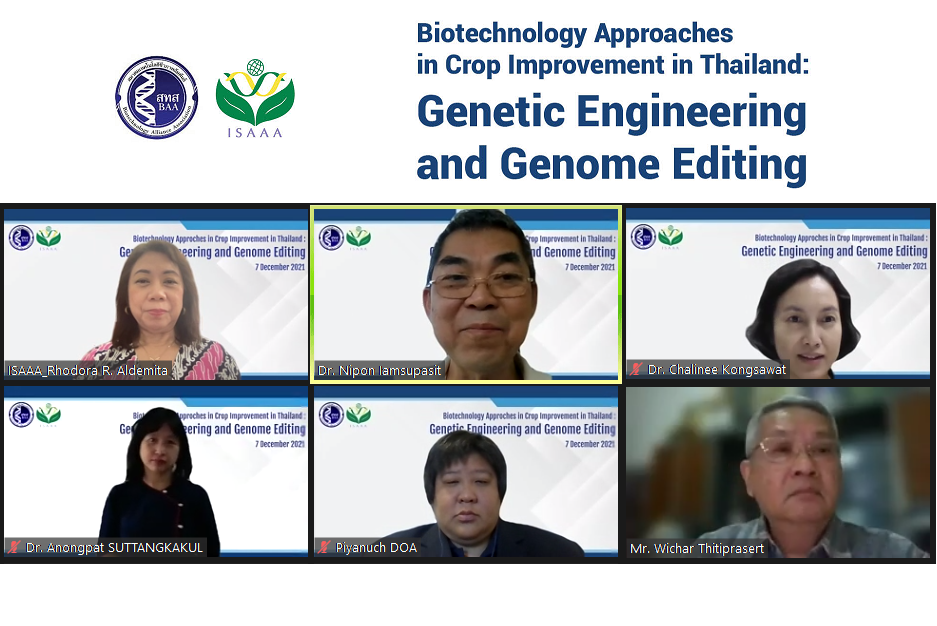
Thailand Presents Impressive Line-Up of Biotech Crop R&D During ISAAA's Latest Webinar
December 9, 2021| |
The latest episode of the ISAAA Webinar Series on genome editing highlighted the recent updates of Thailand's biotechnology research and regulations. Among the topics discussed were Thailand's biotech products in the pipeline, as well as the policy considerations of genome editing in the country.
The webinar was hosted by Thailand's Biotechnology Alliance Association via Zoom on December 7, 2021. It was also streamed live on Facebook through ISAAA.org's Facebook accounts. Researchers and regulators from the country were invited as resource speakers for the webinar. Among them were Asst. Prof. Dr. Anongpat Suttangkakul of the Department of Genetics of the Faculty of Science in Kasetsart University, Dr. Piyanuch Sornchai of the Biotechnology Research and Development Office of the Department of Agriculture (DOA), and Dr. Chalinee Kongsawat, Manager of the Biosafety Section of the National Center for Genetic Engineering and Biotechnology. Dr. Nipon Iamsupasit, President of BAA, gave the welcome remarks. Also present was Dr. Rhodora Romero-Aldemita, Director of the ISAAA SEAsiaCenter, who provided an overview of crop biotechnology, its global adoption rates and benefits.
Asst. Prof. Dr. Anongpat Suttangkakul gave an update on the genome editing research and development at Kasetsart University. Their products in the pipeline include the salt-tolerant orchid, salt-tolerant sugarcane, high production Andrographis, haploid-inducer inbred cassava, non-browning pineapple, and high-nitrogen use efficienct cucumber. On the other hand, Dr. Piyanuch Sornchai presented the DOA's research efforts on genome editing which include the papaya resistant to the papaya ringspot virus, and non-browning pineapple. There is also research on RNAi technology, development of GMO detection methods through real-time PCR, digital droplet PCR, and detection method for surveillance. Dr. Piyanuch Sornchai also briefed the audience on the process on how to apply for the importation of GM crops intended for research.
Lastly, Dr. Chalinee Kongsawat gave a presentation about the current situation of biosafety in Thailand in which she explained that Thailand currently does not allow commercial planting of GM crops. GM seeds are only allowed in the country for research purposes. For food and feed, only GM soybean and GM corn grains are imported given that these are proven to be safe for humans and the environment. But more importantly, Dr. Chalinee Kongsawat gave an update that the Thai FDA has drafted a new set of regulations on the notification of foods derived from GMOs and on the notification on the labeling of foods derived from GMOs. She also discussed how Thailand's Plant Quarantine Act applies to genome editing. The topics were further appreciated during the open discussion that was moderated by Dr. Wicha Thitiprasert of the BAA Advisory. This was followed by the closing remarks of Dr. Romero-Aldemita.
Catch the full episode on ISAAA.org's Facebook account. Email knowledge.center@isaaa.org for inquiries.
| |
You might also like:
- Communication Challenges and Convergence in Crop Biotechnology - Thailand
- Thai Farmer Highlights Role of Biotech in Changing the Course of Agriculture
- Thailand Positive towards Biotech in Development Plan
Biotech Updates is a weekly newsletter of ISAAA, a not-for-profit organization. It is distributed for free to over 22,000 subscribers worldwide to inform them about the key developments in biosciences, especially in biotechnology. Your support will help us in our mission to feed the world with knowledge. You can help by donating as little as $10.
-
See more articles:
-
News from Around the World
- USDA FAS Reports Biotech Updates in Pakistan and Korea
- International Collaboration Brings Wild Wheat's Untapped Diversity into Elite Lines
- Global Database Reveals Humans are Biggest Driver of Plant Homogenization
- Thailand Presents Impressive Line-Up of Biotech Crop R&D During ISAAA's Latest Webinar
- FSANZ Opens Call for Comments on GM Wheat Product Importation
- ISAAA to Release Primer on Genome Editing
- Microbiome Study Provides Strategies for Healthy and Climate-Resistant Fruit and Vegetables
-
Research Highlights
- Suppressing Jasmonate Signaling Attenuation Confers Stress Tolerance in Arabidopsis
-
Plant
- University of Texas Scientists Discover Potential New Gene Editing Tools
- Scientists Use TALENs to Edit Tuna
- Researchers Edit Genomes of Microbes Growing in a Community of Different Species
-
Health
- Omicron Variant Could Weaken COVID Vaccine Protection
-
Read the latest: - Biotech Updates (February 11, 2026)
- Gene Editing Supplement (January 28, 2026)
- Gene Drive Supplement (February 22, 2023)
-
Subscribe to BU: - Share
- Tweet

